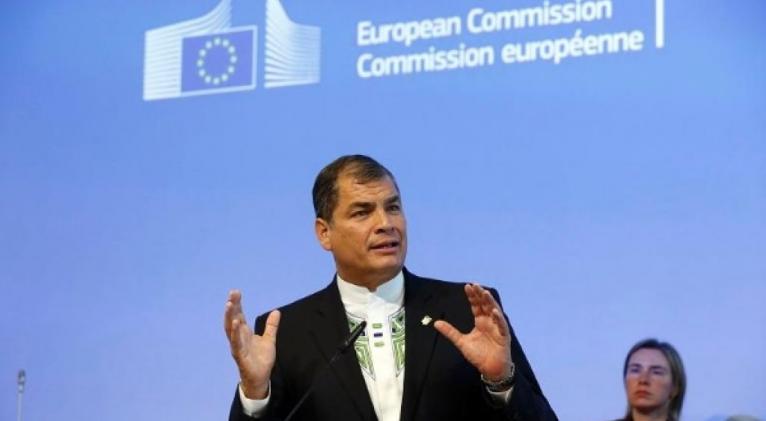EU and US Thrived on Protectionism, Why Can't We? Asks Correa
especiales

The president of Ecuador and pro-tempore president of the CELAC bloc, Rafael Correa, says that Latin American and Caribbean nations form a region that is developing quickly through the creation of small and medium businesses, but need to resort to trade practices that Europe and the United States use in order to thrive in the world economic order.
The South American leader, who holds a PhD in economics told those at the opening session, “We were told that protectionism was bad, however that is how the economies of Europe and the United States have thrived and their companies grown.”
The second summit between the EU and the Community of Latin American and Caribbean Nations is currently underway in Belgian capital city Brussels, which is also home to the EU’s governing body.
Correa also said that poverty, and extreme poverty, have been successfully reduced in many countries in Latin America and the Caribbean, but recognized they are still a widespread problem not only in the region, but around the world as well.
He also said that poverty is the result of social injustice, such as exclusion from education and dignified jobs and salaries, and due to the concentration of riches.
“To eradicate poverty is a moral imperative not only in our countries but in the whole world,” he added.
“Poverty is not only the fruit of the lack of resources anymore, but of exclusion and the concentration of riches,” he said.
Correa explained that human labor is the goal of production and a fair and dignified salary is the base of equality. But he also expressed that education and the promotion of human talent is essential to economic growth and ending inequality.
The president praised the success of small and medium-sized businesses (SME) in Europe, and said they would be equally successful in Latin America and the Caribbean if they had the same access to credits, financial backing and the proper training and technical support.
“The SMEs in Europe have been successful thanks to the support that they receive, while in Latin America we lack the vision and the sufficient resources to support this sector,” he said.
President Correa stressed the importance of the two-day summit in Brussels, but emphasized that these have to respect each nation’s right to sovereign government.
The conference is being attended by some 60 heads of state and high-ranking officials to tackle the issues of climate change, investment, and the Colombian peace talks.
The theme of the event this year is "Shaping our common future: working for prosperous, cohesive and sustainable societies for our citizens.”
CELAC, established in 2010 as an alternative to U.S.-run bodies like the Organization of American States, has now cemented its international significance. It last met with the EU in 2013 in Chile.
“It will be the occasion to underline the importance of EU-CELAC cooperation in a complex, rapidly changing world,” the organizers of the event said in a statement.
On Tuesday, Correa, whose country holds the pro-tempore presidency of the CELAC bloc, met with his EU counterpart Donald Tusk in the Belgian capital ahead of the conference.
Meanwhile, EU Foreign Policy Chief Federica Mogherini also met with Ecuador’s foreign minister, Ricardo Patiño, to sign a draft agreement to forge stronger links between Latin America and Europe.
"Today, we have jointly signed the establishment of a EU-Latin American-Caribbean Foundation on the basis of transforming it into an international body that, we believe, will help us work even more among our societies," Mogherini said.
This content was originally published by teleSUR at the following address:
http://www.telesurtv.net/english/news/Ecuadors-Rafael-Correa-Said-EU-US-Thrived-on-Protectionism-20150610-0048.html. If you intend to use it, please cite the source and provide a link to the original article. www.teleSURtv.net/english













Add new comment